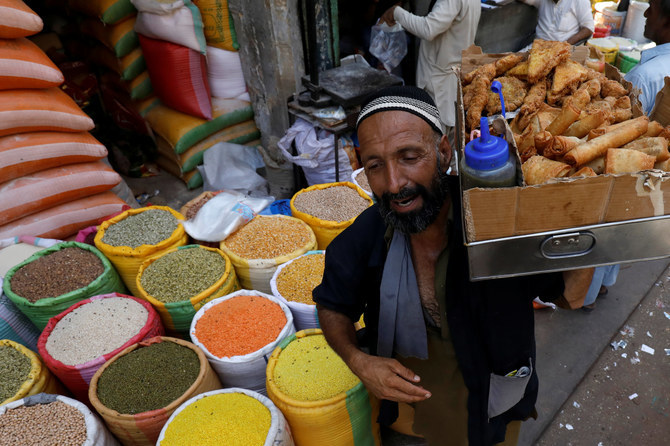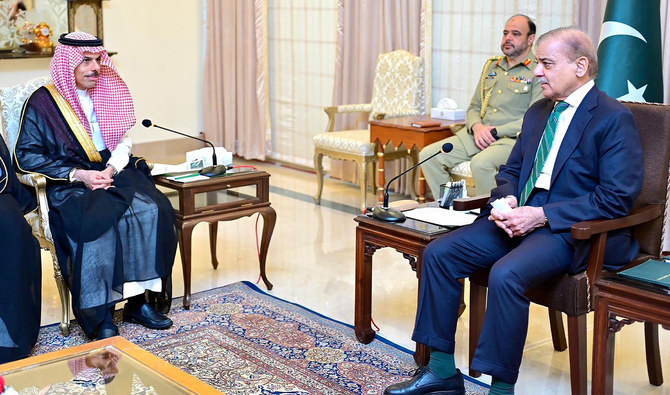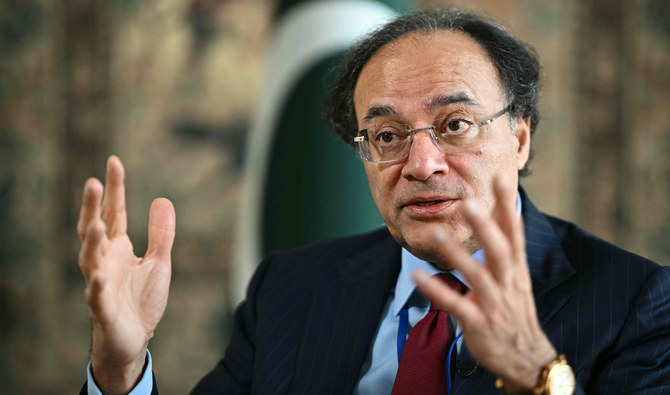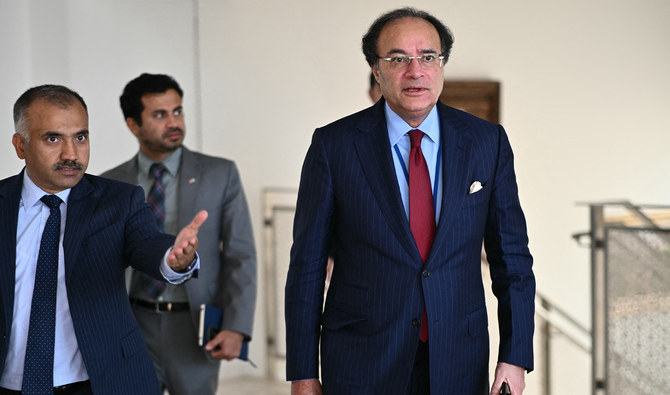ISLAMABAD: The International Monetary Fund and Pakistan reached a “staff level agreement” on Sunday for a $6 billion bailout package, the Fund said in a statement, following months of negotiations on a deal that aims to bolster Pakistan’s flagging economy and perilously low foreign exchange reserves.
The agreement marks a step forward for Pakistan’s new Prime Minister Imran Khan as he tries to find ways to fix the country’s finances and show his commitment to restructuring its moribund economy. But it also highlights a sense of urgency for Pakistan where the central bank has only about $8 billion left in reserves, enough to cover less than eight weeks of imports.
“The Pakistani authorities and the IMF team have reached a staff level agreement on economic policies that could be supported by a 39-month Extended Fund Arrangement (EFF) for about $6 billion,” the IMF said in a statement.
“This agreement is subject to IMF management approval and to approval by the Executive Board, subject to the timely implementation of prior actions and confirmation of international partners’ financial commitments.”
Pakistan has already once averted a balance of payments crisis in 2013 after securing a $5.3 billion IMF loan package, as well as an $11 billion package in 2008, which was suspended after economic and reform targets were missed.
Talks with the IMF began soon after Khan’s government was appointed last August but a package has been held up by differences over the pace and scale of reforms that Pakistan would be required to undertake.
The IMF has pressed Pakistan to improve tax revenue collection, bolster foreign currency reserves and narrow a current account deficit expected to top 5 percent of gross domestic product this year. The Fund has also pushed Pakistan to embrace a flexible rupee policy. Pakistani officials fear these steps will further hurt economic growth, cause of spike in the key interest rate and push the Pakistani rupee further down.
The IMF said on Sunday the new bailout package would support the Pakistani government’s ambitious macroeconomic and structural reform agenda during the next three years, including a push to improve public finances and reduce public debt through tax policy and administrative reforms.
“At the same time, a comprehensive plan for cost-recovery in the energy sectors and state-owned enterprises will help eliminate or reduce the quasi-fiscal deficit that drains scarce government resources,” the statement said.
These efforts, the Fund said, would create fiscal space for a substantial increase in social spending to strengthen social protection as well as in infrastructure and human capital development.
Outlining critical steps Pakistan needed to take in its fiscal strategy, the IMF said the upcoming budget, to be announced this month, would aim for a primary deficit of 0.6 percent of GDP supported by tax policy revenue mobilization measures to eliminate exemptions, curtail special treatments, and improve tax administration.
“This will be accompanied by prudent spending growth aimed at preserving essential development spending, scaling up the Benazir Income Support Program and improve targeted subsidies, with the goal of protecting the most vulnerable segments of society,” the IMF said. “The State Bank of Pakistan will focus on reducing inflation, which disproportionately affects the poor, and safeguarding financial stability.”
“A market-determined exchange rate will help the functioning of the financial sector and contribute to a better resource allocation in the economy,” the IMF said.
The IMF has an unhappy history with Pakistanis, many of whom see the package negatively. In the past, the government has failed to meet the terms of a previous package in 2008, and the country is still struggling to repay billions of dollars of debt from that and a subsequent package.
Khan’s government is also ideologically hostile to international financial assistance, and he campaigned before the election on a platform of economic autonomy but has since gone to the IMF as well as Saudi Arabia, UAE and China for bailouts.
Inflation at its highest in more than five years has shocked many Pakistanis who voted for Khan and his promise to eradicate poverty, create jobs and build an Islamic welfare state.
The central bank forecasts growth at 3.5 to 4 percent in the 12 months to end-June, well short of a government target of 6.2 percent. The IMF paints a gloomier picture, predicting Pakistani growth of 2.9 percent in 2019 and 2.8 percent the following year.
IMF says has agreed to $6 billion deal with Pakistan to support growth
IMF says has agreed to $6 billion deal with Pakistan to support growth

- Package will support government’s ambitious macroeconomic, structural reform agenda for three years
- IMF says upcoming Pakistan budget will aim for primary deficit of 0.6 percent of GDP
Planning minister says Saudi Arabia to invest $5 billion to boost Pakistan’s economy

- Ahsan Iqbal says the national economy can reach a $3 trillion mark by 2047 with 9% growth rate
- He informs a summit the government plans to maximize investment from UAE, Kuwait and Qatar
KARACHI: Federal Minister for Planning and Development Ahsan Iqbal announced on Tuesday Saudi Arabia was expected to invest $5 billion in Pakistan, adding the administration in Islamabad was also trying to secure investment from other Gulf states to strengthen the national economy.
Amid economic challenges, Pakistan has been actively trying to attract foreign investment and established the Special Investment Facilitation Council (SIFC), a civil-military hybrid body, last year for the purpose.
The SIFC was created to serve as a single window for all foreign investment activities, offering a simplified and more direct route for international investors interested in various sectors such as mining, agriculture, energy, information technology and defense manufacturing.
The body was tasked to address procedural bottlenecks, accelerate policy reforms and create a more favorable investment climate, with a special focus on Gulf economies.
“Saudi Arabia will soon invest $5 billion in Pakistan and in this regard, Prime Minister Shehbaz Sharif will soon visit Saudi Arabia, followed by an expected visit of the Saudi Crown Prince Mohammed bin Salman to Pakistan,” the Planning Commission of Pakistan quoted the minister as saying in an official statement.
Iqbal issued the statement while speaking at a business summit in Islamabad.
He mentioned that discussions were ongoing with the United Arab Emirates, Kuwait and Qatar to maximize investment in Pakistan.
The planning minister said if Pakistan managed to increase its exports to $100 billion in the next seven to eight years, it would achieve a significant economic takeoff.
He maintained that Pakistan could become a $2 trillion economy by 2047 with 7 percent growth, adding it could also reach a $3 trillion mark by maintaining 9 percent growth.
Pakistan, Saudi Arabia and Uzbekistan ink ‘landmark’ agreement to promote trade, investment

- As per agreement, Uzbekistan’s largest bank and a Pakistani firm will support investors in all three countries
- Partnership to attract foreign investment particularly in key sectors of energy, infrastructure and agriculture
ISLAMABAD: Pakistan, Saudi Arabia and Uzbekistan have signed a “landmark” partnership agreement to boost economic cooperation and create new opportunities for investors in the region, Pakistan’s state-run television reported on Tuesday.
As per the terms of the agreement, Uzbekistan’s largest bank Ansher Capital will work closely with KASB Securities Limited (KASB), a leading Pakistani stock and commodity brokerage firm, to provide financial advisory and corporate finance services to investors in all three countries, the state media said.
Both firms will support investors and traders in Pakistan, Uzbekistan and Saudi Arabia by providing expert guidance on navigating financial markets, the Pakistan Television (PTV) said.
“In a significant development, Uzbekistan, Pakistan, and Saudi Arabia have signed a landmark partnership agreement aimed at promoting investment and trade between the three countries,” PTV said.
“The partnership is expected to expand the market and attract foreign investment, particularly in key sectors such as energy, infrastructure, and agriculture.”
The report said that the agreement is also expected to strengthen trade ties between the three countries, with a focus on increasing trade volumes and promoting economic integration.
“The partnership will enable businesses to tap into new markets and access new investment opportunities, creating jobs and driving economic growth,” PTV said.
Pakistan and Saudi Arabia enjoy strong trade, defense and cultural ties. The Kingdom is home to over 2.7 million Pakistani expatriates and serves as the top destination for remittances to the cash-strapped South Asian country.
Saudi Foreign Minister Prince Faisal bin Farhan arrived in Pakistan last week for a two-day visit aimed at strengthening bilateral economic cooperation and pushing forward previously agreed investment deals. Pakistan has said it pitched investment projects worth $30 billion to Riyadh during Prince Faisal’s visit.
Islamabad has sought trade and economic partnerships with bilateral partners and allies as it seeks to navigate a macroeconomic crisis that has seen its reserves plummet to historic lows and its currency weaken significantly.
Pakistan’s finance minister says new IMF loan agreement targeted for early July

- The quantum and duration of new loan is still not clear, though the government wants at least a three-year program
- Muhammad Aurangzeb says the modalities of the new loan will be thrashed out with an IMF delegation next month
ISLAMABAD: Pakistan’s finance minister Muhammad Aurangzeb said on Tuesday the country planned to discuss the contours of a new loan program with an International Monetary Fund (IMF) delegation next month while hoping to reach a staff-level agreement with the global lender by early July.
Pakistan secured a $3 billion IMF bailout last year to avert a sovereign default and hopes to receive the final tranche later this month. However, the government wants a fresh IMF loan since the country continues to face tough economic challenges and plans to implement structural reforms.
“We are still hoping that we can get into a staff-level agreement by the time June is done or early July so that we can move on,” the finance minister said while addressing a news conference.
He informed he had good discussions with IMF and World Bank officials during the spring meetings held by both international lending organizations in Washington.
Aurangzeb maintained it was not right to say that the IMF was imposing strict conditions on Pakistan since the country needed to carry out reforms on its own to strengthen its economy.
“This is Pakistan’s program which is helped, supported, assisted by the fund,” he said. “This is how we have to see it since this is the way ownership will come.”
He maintained the country’s foreign reserves were increasing and would reach about $10 billion by the end of June this year well before the new IMF program.
“Once the final tranche comes from the IMF, end of this week, we will be over $9 billion,” he told the media. “By the time we end June, we will be anywhere between $9-10 billion, which is going to be equivalent to two months of import cover.”
The finance minister noted the country had made progress since its foreign reserves dipped to nearly $3.4 billion last year.
He said the stock market was also hitting all-time highs and foreign buyers were entering the market.
“The gross domestic product growth is expected to be at 2.6 percent in the current fiscal year,” he said, adding the government was taking steps to attract foreign investment and keep the current account and fiscal deficits within reasonable limits.
“The current account deficit has been reduced to $1 billion after a 74 percent reduction in FY24,” the minister said, adding the inflation was expected to remain at 24 percent during the ongoing fiscal year, while the trade deficit had been reduced to $17 billion following a 24.9 percent decrease.
He said the quantum and duration of the new IMF program was yet not clear, though the government wanted to secure at least a three-year loan package.
Pakistan and IMF have said they are already in discussions for the new loan.
Aurangzeb said structural reforms carried out by the government include increasing the government’s tax revenue-to-GDP ratio to 13 percent to 14 percent in next two or three years from the current level of around 9 percent, reducing losses of state-owned enterprises through their privatization, and better management of the debt-laden energy sector.
With input from Reuters
Pakistan refiners warn $6 bln upgrades at risk due to fuel price deregulation plan

- Regulatory authority proposes oil marketers, refineries be allowed to set prices instead of government
- Refiners demand they be consulted before the implementation of “irrational recommendations”
KARACHI: Pakistan’s plans to deregulate fuel prices could lead refiners to halt planned upgrades worth up to $6 billion and force some refineries to close, some of the country’s top refiners said in a letter to the country’s oil regulator.
Looking to drive down prices for consumers, the South Asian nation’s Oil & Gas Regulatory Authority (OGRA) has proposed that oil marketers and refineries be allowed to set fuel prices, instead of the government setting prices.
As part of the change, OGRA proposed scrapping or reviewing a rule that requires fuel buyers to purchase supply from local refineries, another issue the refiners said could result in “disastrous consequences.”
The refiners — state-run Pakistan Refinery and private domestic refiners Pak Arab Refinery, Attock Refinery, Cinergyco, and National Refinery — said they were already struggling to operate near full capacity and asked that they be consulted before the implementation of “irrational recommendations.”
“The refining sector requires OGRA support through pragmatic and supportive measures, rather than suggesting ways that if implemented would result in their permanent closure,” the refiners told OGRA on Monday in a letter, which was reviewed by Reuters.
The deregulation was aimed at boosting competition and protecting the public interest, OGRA told Reuters in a statement on Tuesday, but did not respond to specific questions on the letter from the refiners. However, it said in an April 17 presentation reviewed by Reuters the potential impact of deregulation on refinery upgrades had to be assessed carefully, calling it a challenge.
“The refineries upgradation will bring in investment of $5 — 6 billion and not only result in cleaner environment friendly fuels but also result in savings of precious foreign exchange of the country,” the refiners wrote in the letter to OGRA.
Pakistan hopes to get new IMF loan by early July, says finance minister

- Pakistan’s current $3 billion financial arrangement with IMF expires in late April
- Islamabad is seeking “bigger,” long-term loan to ensure macroeconomic stability
Pakistan is hoping to reach a staff-level agreement with the International Monetary Fund by June or early July, its finance minister said on Tuesday.
The country’s current $3 billion arrangement with the fund runs out in late-April, which it secured last summer to avert a sovereign default.
Islamabad is seeking a long-term bigger loan to help bring permanence to macroeconomic stability as well as an umbrella under which the country can execute structural reforms.
“We are still hoping that we get a staff-level agreement by June or early July,” Finance Minister Muhammad Aurangzeb told a conference in Islamabad.
He returned from Washington last week after leading a team to attend the IMF and World Bank’s spring meetings. “We had very good discussions in Washington,” he said.
He said he did not know at this stage the volume and tenure of the longer program.











